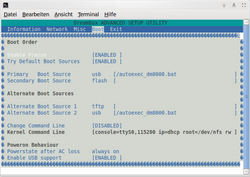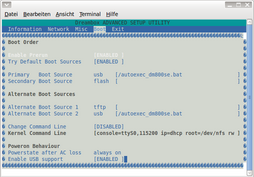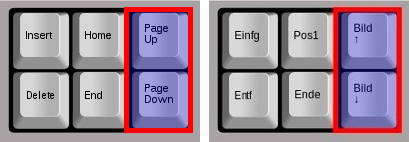MediaBoot Script (en)
InhaltsverzeichnisThe media-boot script by emanuel installs an image onto a media device such as USB, CF, SD or SSD, inclusive the GP3 Feed. While executing the script the device gets partitioned into 3 partitions (boot, swap and root). Subsequently the image (as tar.bz2 archive) is downloaded and unpacked onto the device. After an automatic restart of the Dreambox the image from the device is bootet and offers enough memory for all your needs. Interesting e.g. for the DM800se with small flash capacity ;)
Requirements:
Bios configurationYou need to prepare the Bios to be able to boot via a removable media containing the FAT filesystem. The USB support needs to be activated for all Boxes.
DM 500 HDPrimary boot source: usb [/autoexec_dm500hd.bat] Secondary boot source: flash Enable USB support: [ENABLED]
DM 800HD PVRPrimary boot source: usb [/autoexec_dm800.bat] Secondary boot source: flash Enable USB support: [ENABLED]
DM 800HD sePrimary boot source: usb [/autoexec_dm800se.bat] Secondary boot source: flash Enable USB support: [ENABLED]
DM 7020HDPrimary boot source: usb [/autoexec_dm7020hd.bat] Secondary boot source: flash Enable USB support: [ENABLED]
DM 8000HD PVRPrimary boot source: usb [/autoexec_dm8000.bat] Secondary boot source: flash Enable USB support: [ENABLED]
Configure Media-BootDownload the wanted script from Media-Boot Thread unpack and copy the file with FTP onto the Dreambox in the directory /home/root. Make sure the script has the correct rights, otherwise it can not be executed. Use the following command when connected via telnet or ssh. Attention this command ist for the script for the DMM exp. Image. If you use the script for Merlin, you need to replace media-boot by merlin-media-boot! chmod 755 media-boot
Media-Boot ScriptInformationsInformations about Media-Boot can be displayed as follows. root@dm800se:~# ./media-boot --help
media-boot: is a script to install dreambox image (OE2) on extern device >= 1GB
NOTE: this script is only for advanced users!
Make sure the selected device is not your harddisk!!
Usage: media-boot -i /dev/sd<a-z>
install image on selected device /dev/sd<a-z>
Usage: media-boot -d
shows avaible devices on box
root@dm800se:~#
List the available media devicesWith the following command you can list the available devices. In the example (output reduced) a hard disk and a USB Stick with 8GB is found. The namaof the device is important for starting the Media-Boot script in the next step. In this example the USB Stick has the name /dev/sdb. root@dm800se:~# ./media-boot -d media-boot: found following devices on box: Disk /dev/sda: 500.1 GB, 500107862016 bytes 255 heads, 63 sectors/track, 60801 cylinders Units = cylinders of 16065 * 512 = 8225280 bytes Device Boot Start End Blocks Id System /dev/sda1 1 60801 488384028+ 83 Linux Disk /dev/sdb: 8006 MB, 8006926336 bytes 84 heads, 6 sectors/track, 31028 cylinders Units = cylinders of 504 * 512 = 258048 bytes Device Boot Start End Blocks Id System /dev/sdb1 5 31025 7817216 b Win95 FAT32
Execute Media-BootMedia-Boot is started with the following command. Make sure you use the correct device name, pay attention you don't make a mistake and specify your hard disk. Be patient, the initializing, downloading and unpacking of the image takes a while. Afterwards the box restarts automatically, and the image from the stick is bootet. You can check the availiable memory with df -h. root@dm800se:~# ./media-boot -i /dev/sdb media-boot: installing on device: /dev/sdb media-boot: stoping automount reboot to get back media-boot: stoping udev . . .
Install ChkbootmediaAfter booting the Dreambox successfully from the media device the additional package (chkbootmedia_x.xx_all.ipk) needs to be installed. This is needed to prevent overwriting the autoexec_*.bat when kernel updates are installed. This would lead to a failed boot of the media device. Download the package from hier and copy the file with FTP onto the Dreambox in the directory /tmp. Installthe package with the following commmand. opkg install /tmp/chkbootmedia*
Image sichern / wiederherstellenEin Backup erstellen oder wiederherstellen könnt ihr mit folgenden Befehlen. Das Beispiel bezieht sich wieder auf den Gerätenamen /dev/sdb. Den Gerätenamen könnt ihr auch mit dem Befehl fdisk -l herausfinden. Image sichernLäuft das Image vom Speichermedium, dann könnt ihr es mit dem dd Befehl sichern. Der Sicherungsort in diesem Beispiel ist die Festplatte und der Dateiname des Backups lautet mein_backup.img. Die Grösse des Backups ist übrigens gleich gross wie das benutzte Speichermedium. Das Sichern dauert eine Weile, seid bitte Geduldig und wartet, bis die Kommandozeile wieder bereit ist für neue Befehlseingaben. dd if=/dev/sdb of=/media/hdd/mein_backup.img
Image wiederherstellenStartet die Dreambox vom Flashspeicher und benutzt folgenden Befehl für die Wiederherstellung. Stellt sicher, das der Gerätename korrekt ist. Benutzt hier auch wieder den Befehl fdisk -l und zwar gewissenhaft! Beim Wiederherstellen muss darauf geachtet werden, dass die Grösse der Speichermediums gleich gross (oder grösser ist), wie die der Backupdatei (*.img). Das Wiederherstellen dauert eine Weile, seid bitte Geduldig und wartet, bis die Kommandozeile wieder bereit ist für neue Befehlseingaben. dd if=/media/hdd/mein_backup.img of=/dev/sdb
Tipps & TricksGP3.2 Plugin InstallierenDas Skript bietet die Möglichkeit das GP3.2 Plugin, GP3 Addons oder GP3-Skins zu installieren. Somit sind das BluePanel und die Wunschplugins, Skins nach erfolgreichem Booten sofort verfügbar. Editiert das Skript und sucht folgende Zeilen: EXTRA="" #EXTRA="geminiplugin geminidreamnetcast geminijukebox geminirezapp geminigweather gemininetcastwebif geminirssreader geminiwebcam" Die gewünschten Pakete, müsst ihr beim Eintrag EXTRA="" zwischen die Anführungszeichen einfügen. Der Eintrag, um das GP3.2 Plugin, NFS Server und die Gemini Jukebox zu installieren würde wie folgt ausschauen. EXTRA="geminiplugin gemininfs geminijukebox" Wenn ihr die Paketnamen nicht kennt, dann könnt ihr bei einem eingerichteten Image mit GP3 Plugin die Namen wie folgt ermitteln. Führt aber vorher den Befehl opkg update aus. Der erste Befehl zeigt alle GP3 Pakete, der zweite die GP3 Skins. opkg list *gemini* opkg list *gp-skin*
SupportthreadBraucht ihr Hilfe zu Media-Boot, dann folgt bitte folgendem Link ;)
|


